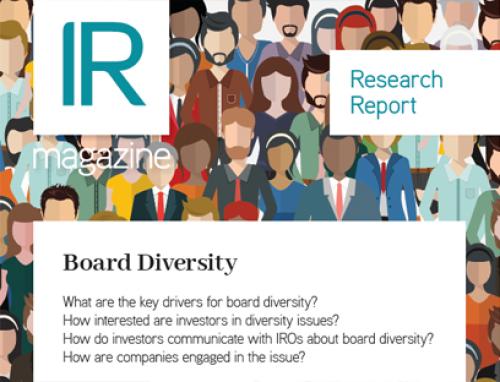There is hope for corporates on the job hunt, with NIRI waiving membership fees and social media opening new avenues for networking.
In the end, it’s a numbers game. A stew of economics, demographics, market dynamics, business realities and personal narrative leads you to the inevitable conclusion that your tenure at your current job is ending. If you have half a nose, you smell it coming so you do the ‘brave’ thing: start the dialogue, control the timing, drive the process and make your plans.
Well, that’s one way of looking at it. But it’s also like seeing a giant wave coming at you. Powerless to avoid it, you point your bow, hang tight and stay afloat. Either way – bingo! – you end up ‘pursuing other interests’ or ‘in transition.’
In addition to portfolios and prices, the current market tumult has upended assumptions and careers. IROs are not immune, not even those with years of experience. I know: it happened to me in March.
I’ve been in this situation before but a few things are different this time. First, every sector is affected as whole industries get restructured. There are no safe havens and assumptions about the typical arc of an IR career are being rewritten. The other difference is me. I’m in a different place in my career and personal history. The combination of factors is both exciting and a little daunting.
I’m not alone, either. Last year, NIRI created a new membership category and waived dues for members in transition. There are now around 80 members benefiting from the program.
NIRI also beefed up the careers section of its website, and it encourages local chapters to support transitional members, including waiving chapter dues and granting scholarships to NIRI’s annual conference, according to institute CEO Jeff Morgan.
Networking challenge
A dozen in-transition IROs gathered at the recent conference in South Florida to share ideas and encouragement. While tips flowed on ‘networking like crazy’, ‘volunteering in NIRI’, and keeping spirits up, two topics dominated the session. About half the participants have embraced social media such as LinkedIn, Facebook and Twitter. While LinkedIn receives high marks as the most professional medium to extend your reach and visibility, and as the social networking site most accessed by executive recruitment and human resource personnel, some IR professionals caution that a too-casual approach to posting personal content online could actually damage your ‘brand’.
Second – and more sobering – everyone openly acknowledges the difficulty in closing on opportunities in the current economy, and they perceive a need to think beyond investor relations.
One IRO I spoke to is anticipating a job change after his company is acquired by a larger competitor; he asks to remain anonymous because the deal is still pending. With eight years of IR experience and five before that as an IR service provider, he believes he has solid contacts and rates himself a ‘super networker, leveraging every single relationship.’
While upbeat, he says the current environment is tough. ‘It’s incredibly difficult to identify the next opportunity,’ he concedes. Though interested in staying in investor relations, he also imagines a potential fit for himself in a ‘treasury role at a small-cap company or strategic planning role’ if a new IR position does not materialize.
Outside the box
Elizabeth Corse left her post as the Virginia-based vice president of IR at Savvis, a mid-cap IT company, last November. An experienced IR professional, she is currently president of the Capital Area NIRI chapter.
Corse observes that her 15-year, IR-only career specialization may hurt her in the current environment. During one recent job interview process, after meeting the executive team, the chemistry seemed right and Corse expected to be a finalist. But the company turned to other candidates – a former sell-side analyst and a former small-cap CFO. Corse’s advice to other IROs is ‘stick your hand up’ and work with treasury or planning to ‘get broader professional responsibility officially on your calling card.’
Though still intent on staying in IR, Corse is also thinking about other options by ‘looking at things I love the most.’ Program development work for her NIRI chapter started her thinking about association management, which – given her DC location – she feels she can use in the epicenter of professional association headquarters.
The necessity of thinking more broadly in the current environment is echoed by Smooch Repovich Reynolds, CEO of executive search firm TRRG, who notes that, for reasons of both talent retention and succession planning, many companies are moving people from finance and accounting into the IR slot.
‘The pendulum has swung pretty dramatically’ in favor of individuals with broad experience who can ‘contribute across internal functional boundaries,’ Repovich Reynolds says. As a result, she cautions, IROs should remain ‘open to the possibility of career change’ and look for opportunities to expand their breadth of knowledge into new domains.
The current economy also means successful IR candidates must keep their egos in perspective, Repovich Reynolds warns. ‘Three years from now, a lateral move or even a step backward will not be held against you,’ she says. ‘Your focus today should be survival, not career advancement.’
With layoffs hitting Wall Street as well, Morgan sees increasing competition for IR slots from non-traditional sources. ‘I get calls from analysts and others looking for IR jobs and advice,’ he notes. ‘They think IR is a sweet spot, a safe spot.’
But he believes successful IR candidates must have a balance of finance, communications, governance, regulatory and market knowledge. Because IROs are expected to explain to management and boards how new micro-second trading technologies, dark pools, hedge funds, options markets and short strategies each affect a company’s stock, ‘those IROs who have market understanding have an advantage,’ Morgan says. As a result, NIRI has increased market knowledge content in its conference and seminar lineup over the last year.
Next steps
And me? Well thanks for asking. I’m linked in and tweeting (appropriately), pumping my network and aggressively following leads and opportunities. I have also reimagined myself, going back to my journalism roots, pre-IR but with a fatter rolodex and broader professional experience. The mechanisms and business models for how news and information are accessed and consumed by individuals, organizations and markets have changed since I was a scribbler two decades ago. It’s exciting to contemplate participating in that redefinition.
As I develop my personal business plan, I’m getting the chance to talk to lots of interesting folks doing some very interesting things across a landscape I otherwise never would have traveled. I’m learning more new things than I thought possible, and I’m having a blast.
One final thought. When I knew I would be in transition, I made four lists: income, savings, health and sanity. I gave myself permission to work on each one. So, occasionally, I’ll put the job search aside and stay longer at the gym, or have lunch with my wife, and I am certainly paying close attention to the healthcare reform debate. I have not yet lowered my golf handicap, nor have I finished Decline and fall of the Roman empire, though they’re both on my ‘sanity’ list. I’m just too darned busy reinventing and reimagining.
Excuse me. I have to take a call.
Career highlights
Brad Allen led the IR function at Cray Research and Digital Equipment Corp and went on to build Imation’s IR and corporate communications functions after its spin-off from 3M in 1996. He left Imation in March 2009. An active NIRI member and former national chairman, Allen is launching an online publication, RiskRewardNews.com.










